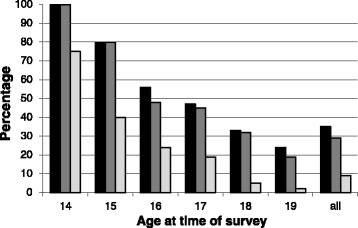A quantitative exploration of the sociocultural context of teenage pregnancy in Sri Lanka
- PMID: 25475411
- PMCID: PMC4266962
- DOI: 10.1186/s12884-014-0394-y
A quantitative exploration of the sociocultural context of teenage pregnancy in Sri Lanka
Abstract
Background: In common with other countries, teenage pregnancy is attracting policy attention in Sri Lanka because of the risks it poses to maternal and infant health and social and economic well-being. This study aimed to increase understanding of the context of teenage pregnancy, by (1) describing the socio-economic and demographic characteristics of pregnant teenagers and their partners; (2) exploring whether teenage pregnancies are planned and how they are received; and (3) exploring factors associated with unplanned teenage pregnancy.
Methods: A population health-register based sample survey was conducted in Badulla District, Sri Lanka. Interviewer-administered questionnaires were administered to two samples: 450 pregnant women aged less than 20 years; and 150 male partners of pregnant women aged less than 20 years. Bivariate statistics described the characteristics and context of teenage pregnancy. Multivariate logistic regression explored correlates of unplanned pregnancy.
Results: Over 60% of pregnant teenagers and male partners indicated that the current pregnancy was planned; while 79% of pregnant teenagers and 85% of male partners welcomed the pregnancy. Most pregnant teenagers were living within stable and supportive family environments, with 94% reporting that they felt 'very well supported'. Nevertheless, a sub-group of pregnant teenagers appeared to be vulnerable, reporting unplanned and unhappy pregnancy; factors that were also associated with first intercourse being reported as not wanted. Levels of reproductive and contraceptive knowledge were poor among both pregnant teenagers and male partners. Just 46% of teenagers and 64% of male partners knew that pregnancy was possible at first intercourse. Mothers appear to be an important source of information and support for young women, with peers being reported far less often.
Conclusions: Intervention to reduce teenage pregnancy must recognise the normative nature of early childbearing for the majority of girls who currently conceive and their families. Avoiding such pregnancies will require a fundamental shift in life chances such that delaying pregnancy offers significant socioeconomic advantages. Meanwhile, improved provision of contraceptive information and services is needed to support the delay of second pregnancies for young mothers. In addition, strategies to identify and protect those girls who are vulnerable to unwanted sexual activity are needed.
Figures

References
-
- World Health Organization . Using Human Rights to Advance Sexual and Reproductive Health of Youth and Adolescents in Sri Lanka. Colombo: WHO; 2008.
-
- Fernando D, Gundawardena N, Senarath U, Weerasinghe M, Galwaduge C, De Silva C. Prevalence, trends and district differentials in teenage pregnancies. J College Community Physicians Sri Lanka. 2011;16(2):21–30.
-
- Goonewardene IM, Waduge RP. Adverse effects of teenage pregnancy. Ceylon Med J. 2005;50(3):116–120. - PubMed
-
- Gunarathne KA, Goonewardane M. Teenage Pregnancy and contraception. Sri Lanka J Obstet Gynaecol. 2001;23:15–19.
Publication types
MeSH terms
Grants and funding
LinkOut - more resources
Full Text Sources
Other Literature Sources
Medical

